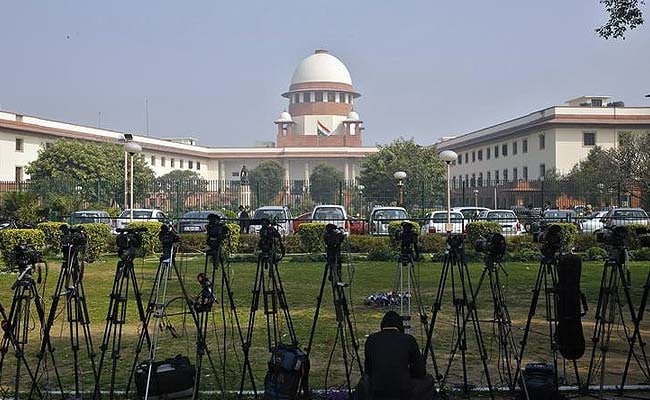
File Photo: Supreme Court of India
New Delhi:
The Supreme Court today sought responses from the Centre, the Election Commission and six political parties, including Congress and BJP, on a plea to declare all national and regional political parties "public authorities" to bring them under the ambit of the Right to Information (RTI) Act.
"Issue notice," a bench comprising Chief Justice H L Dattu and justices Arun Kumar Mishra and Amitava Roy said.
The Association for Democratic Reforms, an NGO, has also sought a direction that the political parties be asked to declare all donations, including those below Rs 20,000 also.
Lawyer Prashant Bhushan, appearing for the NGO, contended that political parties were public authorities and hence amenable to the RTI Act.
The Central Information Commission, in its detailed order, had held that political parties were public authorities and hence should disclose the information under RTI Act.
"Political parties do not have to pay the income tax on the donations and, moreover, the donations below Rs 20,000 are not to be disclosed under the law by them," the lawyer said, adding that these parties also controlled the legislature and the law-making process.
Earlier, the NGO had approached SC seeking transparency and accountability in functioning of recognised national and regional political parties.
It had claimed that the political parties received huge sums of money in form of donations and contributions from corporates, trusts and individuals but do not disclose complete information about the source of such donations.
In its plea, the NGO had urged the apex court to direct all national and regional parties to mandatorily disclose details about their income as well as expenditure.
It had also sought declaration of entire details of donations and funding received by the political parties, irrespective of the amount donated and details of donors making donations to them and to electoral trusts.
The petition had claimed that political parties enjoyed a stronghold over their elected MPs and MLAs under Schedule 10 of the Constitution that makes it compulsory for members of either Houses of Parliament or state legislatures to abide by the directions of their parties, failing which they stand to be disqualified.
"Issue notice," a bench comprising Chief Justice H L Dattu and justices Arun Kumar Mishra and Amitava Roy said.
The Association for Democratic Reforms, an NGO, has also sought a direction that the political parties be asked to declare all donations, including those below Rs 20,000 also.
Lawyer Prashant Bhushan, appearing for the NGO, contended that political parties were public authorities and hence amenable to the RTI Act.
The Central Information Commission, in its detailed order, had held that political parties were public authorities and hence should disclose the information under RTI Act.
"Political parties do not have to pay the income tax on the donations and, moreover, the donations below Rs 20,000 are not to be disclosed under the law by them," the lawyer said, adding that these parties also controlled the legislature and the law-making process.
Earlier, the NGO had approached SC seeking transparency and accountability in functioning of recognised national and regional political parties.
It had claimed that the political parties received huge sums of money in form of donations and contributions from corporates, trusts and individuals but do not disclose complete information about the source of such donations.
In its plea, the NGO had urged the apex court to direct all national and regional parties to mandatorily disclose details about their income as well as expenditure.
It had also sought declaration of entire details of donations and funding received by the political parties, irrespective of the amount donated and details of donors making donations to them and to electoral trusts.
The petition had claimed that political parties enjoyed a stronghold over their elected MPs and MLAs under Schedule 10 of the Constitution that makes it compulsory for members of either Houses of Parliament or state legislatures to abide by the directions of their parties, failing which they stand to be disqualified.
Track Latest News Live on NDTV.com and get news updates from India and around the world

